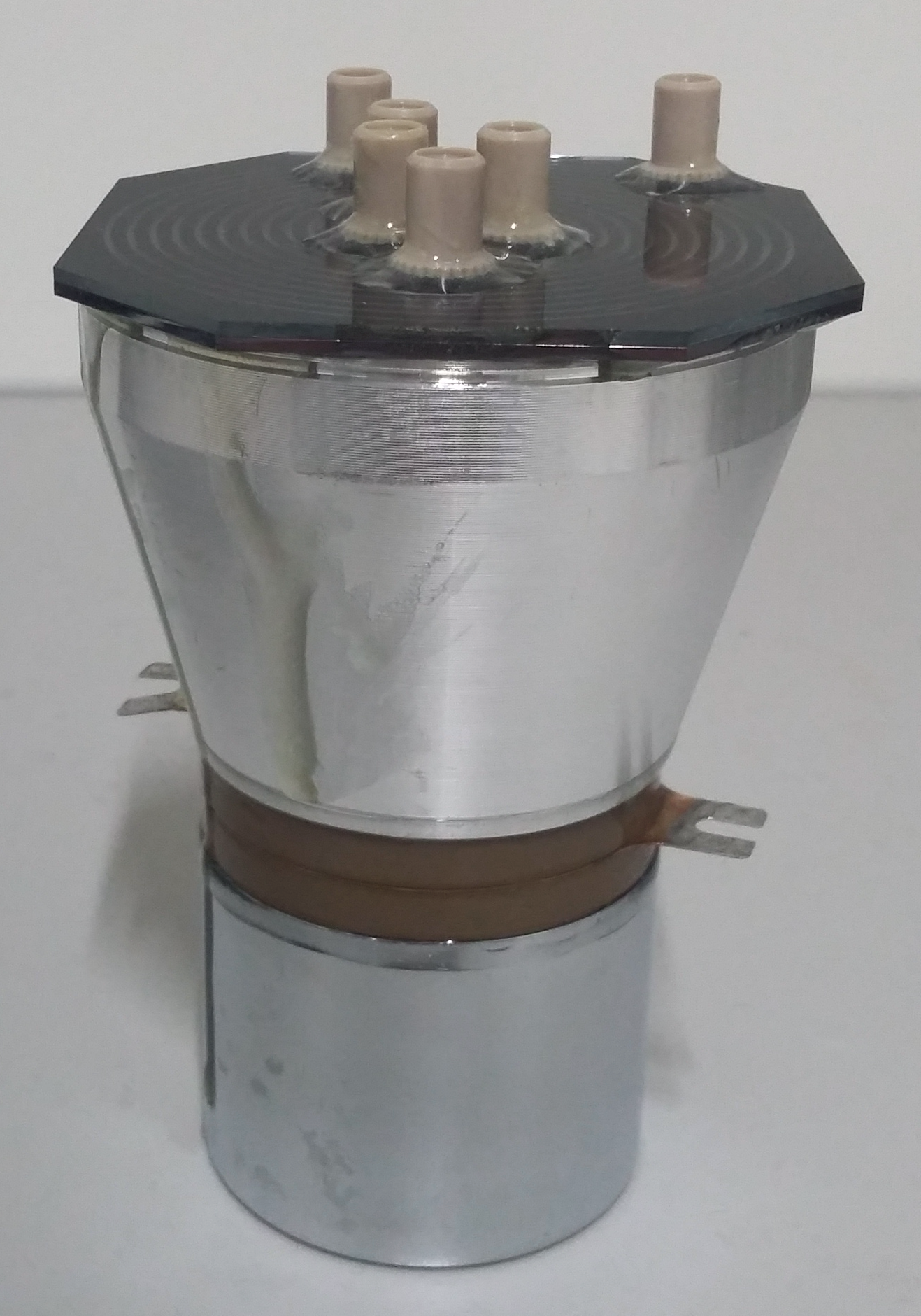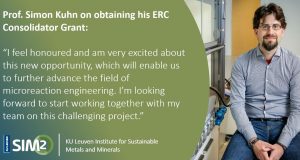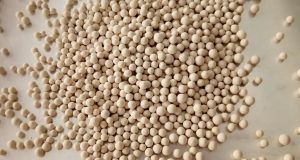Prof. Simon Kuhn is a KU Leuven Professor in the ProcESS division (Department of Chemical Engineering). After obtaining an ERC Starting Grant, he has now also been awarded an ERC Consolidator Grant (MICRODISCO) for his work on novel reactor types for a more sustainable chemical industry. In the present SIM² interview you get to know more about Simon’s research activities and … his strangest talent.
You have recently been awarded with an ERC Consolidator Grant (CoG). Congratulations for that massive achievement, which comes after also receiving an ERC Starting Grant. What is the core topic of your new ERC project?
In the ERC CoG project we will engineer ultrasound-intensified electro- and photochemical reactors for sustainable chemistry. Due to their intrinsic benefits, we focus our research on microreactors. However, the industrial application of these small-scale flow reactors is significantly limited by their currently achieved throughput and productivity.
The project, therefore, aims to overcome these productivity limitations by exploiting the synergistic effect of ultrasound resonance on electro- and photochemical reactors. We will mechanistically understand and predict ultrasound resonance modes in microchannels to achieve phase dispersion and active mixing.
This fundamental insight is then exploited to design microchemical devices, which will increase mass transfer in electrochemical reactors and light utilisation in two-phase photochemical reactors.
This project will provide fundamental understanding of ultrasound resonance modes and a theoretical tool for their prediction, leading to innovative and intensified electro- and photochemical reactors promoting green and sustainable chemistry.
During the past years the European Commission has expressed its ambition to make the EU climate neutral by 2050. How is your research contributing to that goal?
Our contribution is that we support the development of process technology for sustainable chemistry. Firstly, our research is solely focused on continuous manufacturing and continuous flow reactors, especially on the small scale. Compared to conventional (and mostly batch) reactor concepts, these small-scale reactors allow to produce chemicals in a sustainable and efficient way, thereby minimising environmental impact, resource and energy use.

Image: Photograph of an ultrasonic micro-reactor consisting of the reactor plate and a dual frequency Langevin’s type transducer
Secondly, we also investigate the integration of renewable, electricity-based energy sources with our small-scale reactors. And also these (photo-/electro-)chemical reactors will contribute to green chemical manufacture.
One challenge that I personally see is the following. In contrast with batch reactors that can be used in a multipurpose way, there will never be a single, universal flow reactor. We also address this issue by a rational approach to design dedicated flow reactors, implementing fundamental process understanding obtained from numerical models and experiments.
You refer mostly to the chemical industry. However, how can you implement your research ideas in the sustainable metallurgy area?
We are also investigating solid synthesis in our small-scale reactors. We study the crystallisation of organic molecules and the precipitation of inorganic materials, e.g. barium sulfate or calcium carbonate. Our general goal there is to establish continuous processes dealing with solids. The challenge there is that these small-scale reactors tend to clog very easily in the presence of solids, and we have devised several strategies ranging from ultrasound application, to multiphase flows, and scaled-up reactors, to mitigate this issue.
Over the past years you have published numerous peer-reviewed papers. Which paper of yours are you particularly pleased with?
I am obviously proud of all of our papers. The ones I might treasure a bit more are the “unexpected” ones, the ones which are not based on pre-conceived research questions and/or linked to deliverables and work packages. Basically, everything which evolves from an accidental observation in the lab, which strikes us as an interesting phenomenon and which we explore further.
Before arriving in Leuven, you worked in Germany, Switzerland, USA, and the UK. What is your experience with mobility?
A major motivation to move places was gaining experience, new impressions, getting to know different cultures, and also realising how research is done in different systems. This not only broadens one’s own horizon, but can also be very stimulating, as you are embedded in an international environment where people with different expertise and background work.
I always found such environments inspiring and enriching, in the sense that it also brings out the best in your own work. Many of the aspects I try to implement in my research team as well, especially a diverse, open and collaborative environment.
On a more personal level, are there any game-changing moments in your research career? Moments that made you fundamentally rethink your research focus and/or strategy?
During my course of studies, I developed a deeper interest in fluid mechanics. Therefore, I decided for a rather fundamental PhD project studying surface effects on turbulent channel flow. In addition to simulations, I was also doing experiments on a large-scale flow installation exceeding 5 metre in length. After my PhD I moved to a research institute to work on nuclear reactor safety, so even larger installations.
However, I then decided to re-orient myself, and to start working on future technologies for sustainable chemistry. Hence, I decided to move to the US for a postdoc at MIT, where I then switched focus on small-scale reactors (microreactors) and their application to flow chemistry.
It was also there that I started my work on ultrasound integration and its synergistic effect on small-scale reactors. I am still following my passion for fluid mechanics, but now on a much smaller scale and involving multiphase flows (gas-liquid, liquid-liquid, solid-liquid), with the manufacturing of chemicals as target application.
What attracts you in research? How do you stay motivated?
I am passionately curious about research, and especially to gain fundamental understanding of the problems we study. It is always a highlight when you can connect the dots or observe something new. I also love to regularly and frequently discuss with my team, to bounce ideas and hypotheses, and plan the next steps. It is also very enriching to see when the people you work with grow beyond themselves.
Finally, just for our readers to know, what is the strangest talent you have?
Thanks to my PhD project and working with a large-scale flow installation filled with water, I can fix any leaks with silicone quite efficiently! Might not be pretty, but always effective, so if you need a hand let me know.
Thank you for this interview. We wish you all the best in your research endeavours.
[Interview: Peter Tom Jones & Tom Van Gerven; Credits portrait photo: © KU Leuven – Rob Stevens]
Some key papers by Prof. Simon Kuhn in the field of microreactors for continuous manufacturing:
- Roibu, A., Van Gerven, T. & Kuhn, S. (2020) Photon Transport and Hydrodynamics in Gas-Liquid Flows. Part 1: Characterization of Taylor Flow in a Photo Microreactor. ChemPhotoChem 4, 5181-5192. http://doi.org/10.1002/cptc.202000065
- Dong, Z., Udepurkar, A. & Kuhn, S. (2020) Synergistic effects of the alternating application of low and high frequency ultrasound for particle synthesis in microreactors. Ultrason. Sonochem. 60, 104800. http://doi.org/10.1016/j.ultsonch.2019.104800
- Dong, Z., Fernandez Rivas, D. & Kuhn, S. (2019) Acoustophoretic focusing effects on particle synthesis and clogging in microreactors. Lab Chip 19, 316–327. http://doi.org/10.1039/c8lc00675j
- Fatemi, N., Dong, Z., Van Gerven, T. & Kuhn, S. (2019) Micro-bubbles as heterogeneous nucleation site for crystallization in continuous microfluidic devices. Langmuir 35, 60– 69. http://doi.org/10.1021/acs.langmuir.8b03183
- Delacour, C., Lutz, C. & Kuhn, S. (2019) Pulsed ultrasound for temperature control and clogging prevention in micro-reactors. Ultrason Sonochem 55, 67–74. http://doi.org/10.1016/j.ultsonch.2019.03.012
- Sebastian, V., Kuhn, S., Kulkarni, A. & Jensen, K.F. (2012) Controlled Flow Synthesis of Monodisperse Gold Nanoparticles using a Segmented Flow Microfluidic Platform. Langmuir 28, 7007–7013. http://doi.org/10.1021/la205131e
- Kuhn, S., Noël, T., Gu, L., Heider, P.L. & Jensen, K.F. (2011) A Teflon microreactor with integrated piezoelectric actuator to handle solid forming reactions. Lab Chip 11, 2488– 2492. http://doi.org/10.1039/c1lc20337a
Biography Prof. Simon Kuhn
Prof. Kuhn is a professor at the ProcESS division in the Department of Chemical Engineering at KU Leuven where he has been a faculty member since 2014. Simon completed his PhD in Process Engineering at ETH Zurich and his undergraduate studies in Chemical Engineering at TU Munich. After obtaining a postdoctoral fellowship to join the Department of Chemical Engineering at MIT (2010-2012), Simon joined University College London (UK) as assistant professor before moving to Leuven in 2014. His research interests lie in the characterisation of transport processes in complex flows using experiments and simulations, scaling-up microreaction systems, and design of novel flow reactors incorporating alternative activation modes (light, ultrasound, electrochemistry).
https://cit.kuleuven.be/process/research/transport_phenomena_and_multiphase_systems
Want to know more about SIM²?
SIM² KU Leuven is the KU Leuven Institute for Sustainable Metals and Minerals (SIM² in short). SIM² is one of the five official KU Leuven Institutes that were endorsed by the KU Leuven Academic Council. SIM² has more than 240 members, coming from a wide range of (interdisciplinary) research groups and departments at KU Leuven. SIM²’s mission is “to develop, organise & implement problem-driven, science-deep research & future-oriented education, contributing to the environmentally friendly production & recycling of metals, minerals & engineered materials, supporting (…) a climate-friendly, circular-economy”. Read more about the new KU Leuven Institute here. Read more in this featured article in Geniaal.
Follow SIM² on LinkedIn: https://www.linkedin.com/company/18118889
Interviews with other SIM² colleagues: https://kuleuven.sim2.be/meet-our-colleagues/





